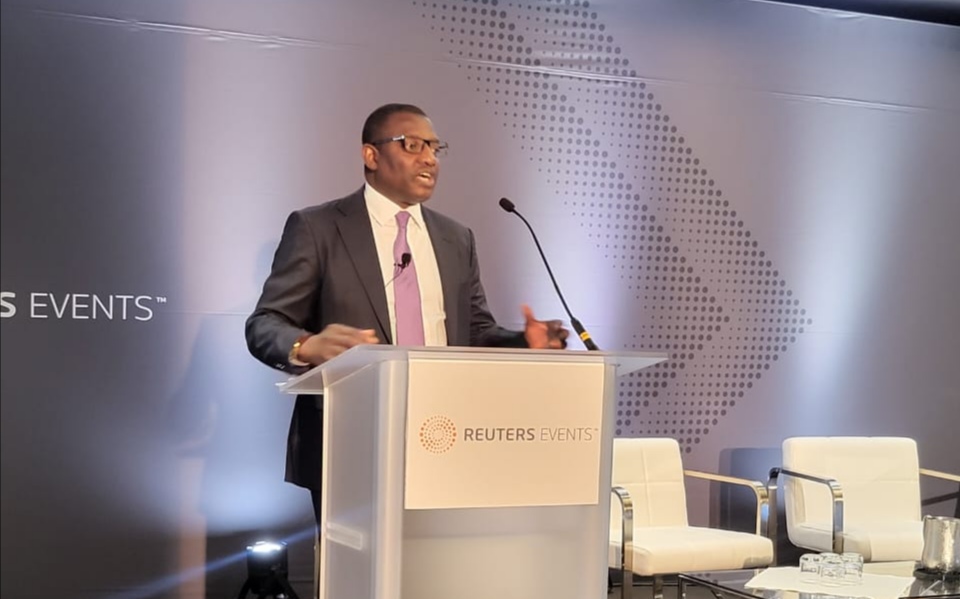At Global Energy Summit, NAPIMS Boss, Wunti Rallies Investors For Development Of Nigeria’s Gas Sector
The Group General Manager, National Petroleum Investment Management Services, Bala Wunti, on Tuesday rallied investors at the Global Energy Transition Summit for the development of Nigeria’s gas sector.
The event holding in New York, United States was organized by Reuters and had as its theme, “Setting the global transition agenda.”
Advertisement
Wunti in his presentation titled, “What does the future hold for Natural Gas?” said that with attention shifting from fossil fuel to more cleaner energy sources, time has come to begin to increase investments that would unlock these energy sources.
The energy industry is currently facing increasing demands to reducing greenhouse gas emissions so as to achieve the goals and commitments of Paris Accord and COP 26.
Nigeria is pursuing energy transition in order to promote economic growth and is gradually investing in gas so as to reduce carbon emissions whilst continuing to exploit hydrocarbon resources.
Currently, natural gas is the energy transition fuel for Nigeria.
Advertisement
During the COP26 summit in Glasgow, President Muhammadu Buhari had pledged that Nigeria would cut its carbon emissions and reach net-zero by 2060, underlining the key role of gas in the country’s energy transition roadmap.
While nations such as the United Kingdom, the United States, and the European Union have set targets to achieve net-zero by 2050, Nigeria has opted to join Saudi Arabia and Russia in planning to reach net-zero by 2060.
Speaking at the event, Wunti said that Nigeria has abundant gas resources that can attract significant investors.
Specifically, he said with Nigeria having six quadrillion BTU of energy production annually making it the second highest in Africa, the country’s energy resources can power the city of New York for the next 120 years.
He told the investors that Nigeria has a geographical vintage position with easy access to the Atlantic, Pacific and Indian Ocean giving it unhindered access to the most critical global trade routes and markets.
Advertisement
He said, “If we must get into that energy transition, then it means every source of energy matters and in the context of what we are doing, hydro carbon plays a major role and so it is important that we try to connect the market which provide the platform to unlock the energy source.
“And to unlock this energy source for Nigeria, it requires significant investments and investments can only come by finance. We have seen recently that capital has become discriminatory against fossil fuel. Nobody wants to fund fossil fuel and it is important we recognize that finance today has become less patient.
“Every investor wants to invest today and get his money tomorrow. The energy sector is a long haul and we need finance to deliver energy.”
He told the gathering that the despite call for energy transitioning, oil will continue to account for about 50 per cent of global energy mix by 2050.
Wunti added, “If you look at the consumption of oil, even in 2050, we will still have hydro carbon contributing up to 50 per cent of the global energy mix and if 50 per cent of your global energy mix is being denied investment capital, then we have to make a decision to create the short supply of tomorrow. And when that happens, the consequences of demand and supply will settle and that will lead to very significant crisis which is already happening today.
“We in Nigeria are looking at what does our resource mean to us, how can we support the work and deliver energy that we are delivering? We have seen it that energy demand will grow and we need significant source of energy to close that gap and to do that, we need market, investment and finance.
Advertisement
“We have enough energy resource that can power the whole of New York for 120 years but to unlock it, we need investments and you are cordially invited. When you think of investment destination in Africa, think Nigeria.”
Wunti also spoke on the nexus between markets, finance and investments and energy transition.
In the area of markets, he said that economic development requires energy. According to him, market provide commercial platforms for energy to be traded, adding that energy resources need to be unlocked and delivered to markets.
For investments, Wunti said unlocking energy requires development and the delivery of infrastructure that must be funded under a sustainable manner.
He said, “If we continue to deny investment, it will have significant effect on prices and this will result into high energy prices. And when it comes to the issue of energy transitioning, we should be careful how we exit from high carbon emission to low carbon emission.
“In Nigeria, we have focused on gas and deliver it and to do this, we are looking for investments, finance and the target is to be able to deliver this energy in the most sustainable way so that we will continue to deliver clean, affordable, reliable energy.
“We are taking this very seriously in Nigeria and we invite everybody that has money to come and join us. In Nigeria, energy poverty is very high, we have significant energy deficiency and what we are doing is to switch from biomass to gas and if we do that, we will be in a better position to build a new infrastructure that will be cleaner and better. The target for us is that in 2026, we want to be energy sufficient and then we can start migrating.”



